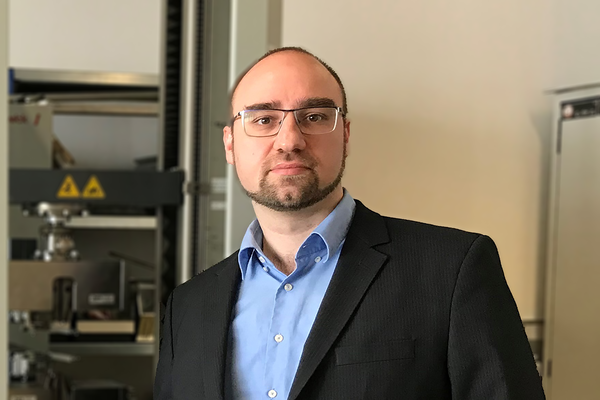Prof Rosemann has been teaching and researching as a newly appointed Professor of Materials Engineering at the Faculty of ING since the summer semester of 2021. He has been fascinated by the fascinating relationships between structure, microstructure and the properties of materials since his student days.
A. Schreyer: Prof Rosemann, you have held the Chair of Materials Engineering at the Faculty of Engineering since March 2021. What are your new responsibilities as a professor?
Prof Rosemann: As the newly appointed Professor of Materials Engineering, I will be teaching the Bachelor's modules Materials Engineering, Heat Treatment and Materials Testing as well as the Master's modules Powder Metallurgy, Materials Diagnostics and Failure Analysis from summer semester 2021. These modules are designed for the Mechanical Engineering and Mechanical Engineering Management degree programmes. They provide students with an excellent overview of the diverse properties and applications of technically relevant materials in mechanical engineering.
In the near future, I will be modernising the laboratory equipment in our six laboratories for our newly introduced Master's modules and designing appropriate laboratory practicals.
I will be continuing my research into stainless steels at the Faculty of Engineering at HTWK Leipzig, i.e. developing new materials and heat treatment concepts and analysing cases of damage. To this end, we are currently working across faculties on a DFG large-scale equipment application for a scanning electron microscope and a computer tomograph, which will be used for basic materials research.
A. Schreyer: How did you decide to specialise in this area of research and teaching? Did you already know what path you wanted to take before you started your studies?
Prof Rosemann: I studied mechanical engineering at Otto von Guericke University and chose to specialise in materials engineering from the 5th semester onwards because I was fascinated by the exciting relationships between structure, microstructure and the properties of materials. Until I started studying, I didn't realise how diverse the world of materials actually is.
Fortunately, I was recruited as a student assistant very early on in my studies and worked in the Corrosion working group under Dr Andreas Heyn until I graduated. The scientific work as a student assistant and also numerous joint conferences, events and projects had a lasting impact on the rest of my life and awakened my desire to continue working in teaching and research.
I stayed in Magdeburg at the Institute of Materials and Joining Technology for my doctorate and wrote my thesis on the influence of heat treatment on the corrosion resistance of martensitic stainless steels, which everyone has held in their hands as a chef's knife. At the same time, I was also heavily involved in student training in Magdeburg, where I enjoyed giving materials technology seminars, practical courses and lectures and supervising numerous student theses and student assistants. During my doctorate and also in my post-doc period, I spent several years at the Federal Institute for Materials Research and Testing (BAM) in Berlin and conducted research on various issues relating to stainless steels in Dr Andreas Burkert's Department 7.6 "Corrosion and Corrosion Protection". I have remained very loyal to this field of research ever since, as I have always had a weakness for complex problems.
However, I was then drawn back to the University of Magdeburg, where I supported the Chair of Metallic Materials of Prof. Dr Thorsten Halle as group leader for metallurgy and heat treatment in teaching, research (and administration). I also owe my appointment at the HTWK to my mentor at the time, Prof Dr Thorsten Halle, who motivated me to apply for the professorship at the Faculty of Engineering at the HTWK Leipzig despite my young age of 34.
A. Schreyer: What skills and interests do you think students who decide to study mechanical engineering at the Faculty of Engineering should have?
Prof Rosemann: I think that a certain enthusiasm for technology and technical problems is very important in engineering. If you then decide on a subject in engineering, there is something for everyone. For me, it was the technical materials that excited me. For my fellow students, it was areas such as electrical engineering, design and mechanics. It was only after four varied semesters of studying mechanical engineering that I knew what actually excited me, and I'm sure that's how many students feel at the start of their studies. This is a normal development that also requires a certain amount of perseverance if the search for an exciting specialisation has not yet been completed. In any case, students should be guided by their interests and not by external factors when choosing a degree programme.
A. Schreyer: What new projects would you like to realise in the future?
Prof Rosemann: I would like to continuously improve my modules over the next few years and, in particular, incorporate more digital teaching videos of materials engineering tests and experiments into the lectures. I would also like to get back to researching materials engineering projects and issues together with students, fill the labs with life again and also train future doctoral students at HTWK as a mentor in the coming years.
